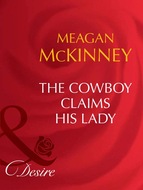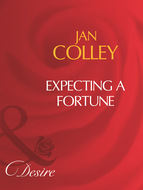Das Buch kann nicht als Datei heruntergeladen werden, kann aber in unserer App oder online auf der Website gelesen werden.
Buch lesen: "The Pregnancy Affair"
A billionaire, a baby—and a family secret that changes everything! Only from New York Times bestselling author Elizabeth Bevarly!
Renny Twigg’s job is simple: locate a mobster’s long-lost grandson—not end up in witness protection with him! But after informing self-made billionaire Tate Hawthorne of his unknown family ties, that’s exactly what happens. It’s clear the sable-haired heartthrob doesn’t want to be the next Iron Don. Still, he’s more than game to be her temporary lover. But when baby makes three... He’s having enough trouble keeping famiglia out of his life. What’s he supposed to do with a family?
“It’s not a good idea,” she said quietly.
He circled her wrists with deft fingers and moved both their hands behind her back, then leaned in again. “Oh, I think it’s a very good idea.”
He started to lower his mouth to hers, and, God help her, Renny stood still for the merest of seconds and waited for him to make contact. He was just so unbelievably… So extremely… So totally, totally…
His lips brushed hers lightly… once, twice, three times, four. Heat splashed in her belly, spilling through her torso and into her limbs, warming parts of her she hadn’t even realized were cold. Then he stepped closer and covered her mouth completely with his, and those parts fairly burst into flames. For another scandalous, too-brief moment, she reveled in the fantasy that was Tate Hawthorne and the wild ride it promised. Then, nimbly, she tugged her hands free of his and somehow broke away to scurry to the kitchenette.
“Hey, are you as hungry as I am?” she asked when she got there.
Belatedly, she realized the glaring double entendre of the question.
* * *
The Pregnancy Affair is part of the Accidental Heirs series: First they find their fortunes, then they find love.
Dear Reader,
If you’ve read my older books, you know I have a not-so-secret fascination with the mob. I have no idea why. Maybe it’s because of the stories my grandmother told me about her mobster neighbors in the Chicago apartment house where she lived in the 1930s. Maybe it’s because of nicknames like “Baby Fat Larry,” “Vinny Carwash” and “Willie Potatoes.” Maybe it’s the hats.
Anyway, I shouldn’t have been surprised when the mob popped up in a book again. What did surprise me was realizing my hero was a made man. Okay, a made toddler. Fortunately, Tate Hawthorne escaped into the witness protection program with his parents at the age of three. Just as well, really. “Tate the Venture Capitalist” doesn’t have the right ring.
Unfortunately, his government-assigned identity has been blown, so he’s taken into protective custody again. Worse, he’s trapped there with Renny Twigg, the woman who accidentally outed him, threw his entire existence into turmoil and potentially endangered his life. Worst of all, the feds have hidden them in the wilds of Wisconsin without so much as basic cable or dial-up internet. Or a post-1999 issue of Maxim. Or a decent wine list. Or, you know, clothes.
It’s going to be a long five days. Whatever will Tate and Renny do to pass the time? Especially when the Scrabble game is missing most of its vowels? And what happens when Renny gets home and discovers she’s brought a fairly life-changing souvenir with her? It’s going to be a long nine months…
Happy reading!
Elizabeth
The Pregnancy Affair
Elizabeth Bevarly

ELIZABETH BEVARLY is an award-winning, New York Times bestselling author of more than seventy books. Although she has made her home in exotic places like San Juan, Puerto Rico, and Haddonfield, New Jersey, she’s now happily settled back in her native Kentucky. When she’s not writing, she’s binge watching British TV shows on Netflix or making soup out of whatever she finds in the freezer. Visit her at www.elizabethbevarly.com.
MILLS & BOON
Before you start reading, why not sign up?
Thank you for downloading this Mills & Boon book. If you want to hear about exclusive discounts, special offers and competitions, sign up to our email newsletter today!
Or simply visit
Mills & Boon emails are completely free to receive and you can unsubscribe at any time via the link in any email we send you.
For my grandmother,
Ruth Elizabeth Hensley Bevarly,
who told me some really great stories when I was a kid.
I miss you, Nanno.
Contents
Cover
Back Cover Text
Introduction
Dear Reader
Title Page
About the Author
Dedication
One
Two
Three
Four
Five
Six
Seven
Eight
Nine
Ten
Eleven
Twelve
Extract
Copyright
One
Renny Twigg threw her car into Park and gazed at the Tudor-style house beyond her windshield. Or maybe she should say Tudor-style castle beyond her windshield. Its walls were made of majestically arranged stones and climbed a full three stories, and they were tatted here and there with just the right amount of ivy. Its stained glass mullion windows sparkled in the late-morning sunlight as if they’d been fashioned from gemstones, and its turrets—one on each side—stretched even higher than the slate roof, looking as if they’d been carved by the hand of a Renaissance artist. The lot on which the mansion sat was nearly a city-state unto itself, green and glorious and landscaped with more flowering shrubs than a Spring Hill catalog.
There was rich, and then there was rich. The first was something with which Renny had a more-than-nodding acquaintance. She’d come from a long line of powerful attorneys, financiers and carpetbaggers, the first of whom had arrived in this country hundreds of years ago to capitalize on the hugely exploitable land and its even more exploitable colonists. The Twiggs who followed had adopted the tradition and run with it, fattening the family coffers more with each ensuing generation. She’d grown up in a big white Cape Cod in Greenwich, Connecticut, had donned tidy blue uniforms for tony private schools before heading off to be a Harvard legacy, and had worn a sparkly tiara—with real diamonds—for her debut eleven years ago. Renny Twigg knew what it was to be rich.
She eyed the massive structure and its imperious gardens again. Tate Hawthorne was obviously rich.
She inhaled a fortifying breath and tucked an unruly dark brown tendril back into the otherwise flawless chignon at her nape. Then she checked her lipstick in the rearview mirror, breathed into her hand to ensure that there were no lingering traces of her breakfast burrito and smoothed a hand over her tan linen suit. Yep. She was perfectly acceptable for her meeting with the man her employer had assigned her to locate. So go ahead, Renny. What are you waiting for?
She eyed the massive mansion again. What she was waiting for was to see if a dragon would come swooping down from one of those turrets to carry her off for his own breakfast. In spite of the colorful landscaping and bright blue summer sky that framed it, the place just had that look about it. As if its owner were some brooding, overbearing Rochester who might very well lock her away in his attic.
Oh, stop it, she told herself. Tate Hawthorne was one of Chicago’s savviest investors by day and one of its most notorious playboys by night. From what she’d learned of him, the only thing he dedicated more time to than making money was spending it. Mostly on fast, lustrous cars and fast, leggy redheads. Renny was five foot three in her kitten heels and had driven up in a rented Buick. She was the last kind of woman a man like him would want to stash away for nefarious purposes.
Even if his origins were pretty freakin’ nefarious.
She opened the car door and stepped out onto the cobbled drive. Although it was only June, the heat was oppressive. She hurried to the front door, rehearsing in her head one last time the most tactful way to relay all the news she had for Tate Hawthorne.
Like how he wasn’t really Tate Hawthorne.
Renny’s employer, Tarrant, Fiver & Twigg—though the Twigg in the name was her father, not her—was a law firm that went by many descriptions. Probate researchers. Estate detectives. Heir hunters. Their services were enlisted by the state of New York when someone died without a will and no next of kin was known or when the next of kin was known but his or her whereabouts were not.
That second option had brought her to Highland Park, a suburb of Chicago for people who were rich. Bennett Tarrant, president and senior probate researcher, had given the job to Renny because she always found the heir she was looking for. Well, except for that one time. And also because she was the only probate researcher available at the time who didn’t have anything on her plate that couldn’t be scraped off with a quick fork to the archives room. For lack of a better analogy. That breakfast burrito had, after all, been hours ago.
And although he hadn’t said so specifically, she was pretty sure another reason Bennett had assigned her the job was to offer her a chance to redeem herself for that one time she hadn’t been able to find the heir she was looking for. Locating someone who would be extremely hard to locate—like Tate Hawthorne—and doing so without screwing it up would make Renny a shoo-in for the promotion that had been eluding her, something that would make her father very proud. Not to mention make him stop looking at her as if she were a complete screwup.
In the meantime, Renny was proud of herself. It took skill and talent to find someone who had been buried in the federal Witness Protection Program along with the rest of his immediate family nearly three decades ago. Well, it took those things and also a friend from high school who had mad hacking skills and could find anything—or anyone—on the internet. But that was beside the point. The point was Renny had found the heir she was looking for, thanks to said friend. Which would, she hoped, put her back on the fast track at Tarrant, Fiver & Twigg and get her father off her back for that one tiny blip that had changed the company’s 100% find rate to a 99.9999% find rate, and jeez, Dad, it wasn’t like she’d lost that one on purpose, so just give her a break. Man.
She rang the doorbell and fanned herself with her portfolio as she waited for a response, since, judging by the size of the house, it could be days before anyone made their way to the front door. So she was surprised to be caught midfan when the door opened almost immediately. Thankfully, it wasn’t Tate Hawthorne who answered. It was a liveried butler, who looked to be about the same age as one of the founding fathers. If the founding fathers were still alive, she meant.
“Good morning,” Thomas Jefferson greeted her. “Miss Twigg, I presume?”
She nodded. She had contacted Tate Hawthorne earlier this week—or, rather, she had contacted his assistant Aurora, who, Renny hadn’t been able to help thinking, sounded like a fast, leggy redhead—and set up a meeting with him for the only fifteen minutes the guy seemed to have available for the entire month of June. And that was only because, Aurora had told her, he could cut short by a teensy bit his preparation for his regular Saturday polo match.
“Hello,” Renny replied. “I’m sorry to be a bit early. I was hoping Mr. Hawthorne might be able to squeeze in another ten or fifteen minutes for our meeting. What I have to tell him is kind of—” life changing was the phrase that came to mind, but it sounded a little melodramatic “—important. What I have to tell Mr. Hawthorne is kind of important.” And also life changing.
“All of Mr. Hawthorne’s meetings are important,” Thomas Jefferson said indulgently.
Of course they were. Hence his having only fifteen minutes in the entire month of June for Renny. “Nevertheless,” she began.
“It’s all right, Madison,” a booming baritone interrupted her.
Renny gazed past the butler at a man who had appeared behind him and who had to be Tate Hawthorne. She knew that, because he looked really, really rich.
His sable hair was cropped short, his skin was sun burnished to the color of a gold doubloon and his gray eyes shone like platinum. He was dressed in a polo uniform—equestrian, not water, unfortunately, because a body like his would have seriously rocked a Speedo—in hues of more precious materials, from the coppery shirt to the chocolate-truffle jodhpurs, to the front-zipper mahogany boots that climbed up over his knees with their protective padding. All of it skintight over taut thighs, a sinewy torso, salient biceps and shoulders broader than the Brooklyn Bridge. It was all Renny could do to not drool.
Unfortunately, she wasn’t as lucky in keeping herself from greeting him less than professionally. “Hiya.” Immediately, she realized her loss of composure and pheromones and amended, “I mean...hello, Mr. Hawthorne.”
“Hello yourself, Ms...” He halted. “I’m sorry. Aurora included your name with the appointment, but I’ve been working on something else this morning, and it’s slipped my mind. And, well...you are a bit early.”
He seemed genuinely contrite that he was at a loss for her name, something for which Renny had to give him credit. Not just because he was being so polite about her having impinged on his time after being told he didn’t have much to spare, but because, in her experience, most high-powered business types didn’t feel contrite about anything, least of all forgetting the name of a junior associate from a law firm they never had dealings with.
Madison the butler moved aside, and she murmured her thanks as she stepped past him into the foyer. She withdrew a business card from inside her jacket and extended it toward Tate Hawthorne.
“I’m Renata Twigg,” she said. Not that she’d felt like a Renata a single day in her life, because Renata sounded like, well, a tall, leggy redhead. Renny had no idea what her mother had been thinking to want to name her that, or what her father had been thinking to insist it be the name she used professionally. “I represent Tarrant, Fiver & Twigg, attorneys,” she concluded.
He took the card from her but didn’t look at it. Instead, he looked at Renny. With way too much interest for her sanity and saliva glands. And—okay, okay—her pheromones, too.
“Renata,” he said, fairly purring the word in a way that reminded her of velvet and cognac. And suddenly, for some reason, Renny didn’t mind her given name at all.
“Thank you so much for making time to meet with me this morning,” she said. “I know you must be very busy.” Duh.
She drove her gaze around the massive black-and-white-tiled foyer to the half-dozen ways out of it—two doors to her right, two doors to her left, and one more framed by a curving staircase that led to the second floor.
“Um, is there someplace we can talk?” she asked.
For a moment, Tate Hawthorne said nothing, only continued to gaze at her in that mind-scrambling, gland-addling way. Finally, he said, “Of course.”
He extended a hand to his left to indicate Renny should precede him. Which she would have done, had she had a clue where he wanted her to go. He could have been gesturing at the doors to her left, the staircase, or to the exit behind himself. He seemed to realize the ambiguity of his action, too, and threw her an apologetic smile that just made him even more charming. As if he needed that. As if she needed that.
“My office is this way,” he told her.
He opted for the exit behind himself, and Renny followed. They passed another eight or nine—hundred—rooms before he finally turned into one that looked more like a library than an office, so stuffed to the ceiling was it with books. There was a desk tucked into a corner, facing to look out the window at a green space behind the house that was even more idyllic than the scene in front, and topped with a state-of-the-art computer and tidy piles of paperwork. Also sitting there was a polo helmet that matched his uniform, so she gathered he was in here when she arrived, trying to cram in more work before heading out to play. The guy clearly took both his business and his pleasure seriously.
“Please, have a seat,” he said, gesturing toward a leather-bound chair that had probably cost more than the gross national product of some sovereign nations. Then he spun around his desk chair—also leather, but smaller—and folded himself into it.
Renny tried not to notice how his clothing seemed to cling even more tightly when he was seated, and she tried not to think about how much she suddenly wanted to drop to her knees in front of him to unzip his boots. With her teeth. Instead, she opened her portfolio and withdrew the handful of documents she’d brought with her to support what was sure to sound like a made-for-cable movie on one of the channels that was way high up the dial.
“Mr. Hawthorne,” she began.
“Tate,” he corrected her.
She looked up from her task, her gaze fastening with his again. Those eyes. So pale and gray and cool for a man who seemed so deep and dark and hot. “Excuse me?” she said without thinking.
He smiled again. She tried not to spontaneously combust. “Call me Tate,” he said. “‘Mr. Hawthorne’ is what they call me at work.”
This wasn’t work? she wanted to ask. It was work to her. At least, it had been before he smiled in a way that made clear his thoughts were closer to pleasure at the moment than they were to business. And, thanks to that smile, now Renny’s were, too.
“Ah,” she started again. Probably best not to call him anything at all. Especially since the only thing coming to mind at the moment was... Um, never mind. “Are you familiar with the name Joseph Bacco?” she asked.
A spark of something flickered in his eyes, then disappeared. “Maybe?” he said. “Something in the news a while back? I don’t remember the context, though.”
Renny wasn’t sure how far Joseph Bacco’s influence might have traveled beyond New York and New Jersey, but he’d been a colorful-enough character in his time to warrant the occasional story in magazines or true-crime shows on TV. And his death had indeed made national news. She tried another tack.
“How about the name ‘Joey the Knife?’”
Tate’s smile this time was tinted more with humor than with heat. And, gee, why was it suddenly so easy for her to think of him as Tate?
“No,” he replied.
“‘Bulletproof Bacco’?” she asked, trying another of Joseph Bacco’s distinctive monikers.
“Ms. Twigg—”
“Renny,” she said before she could stop herself. And immediately regretted not being able to stop herself. What was she thinking? She never invited clients to use her first name. And only Bennett Tarrant and her father called her Renny at work, because they’d both known her since the day she was born.
Tate’s gaze turned hot again. “I thought you said your name is Renata.”
She swallowed hard. “It is. But everyone calls me Renny.”
At least everyone who wasn’t tied to her by business. Which Tate most certainly was. So why had she extended the invitation to him? And why did she want to extend more invitations to him? None of which included him calling her by name and all of which had him calling her hot, earthy things as he buried himself inside her and drove her to the brink of—
“You don’t seem like a Renny,” he said. Just in the nick of time, too. The last thing she needed was to have an impromptu orgasm in front of a client. Talk about a black mark on her permanent record.
“I don’t?” she asked, in a voice normally used only when having an impromptu orgasm. Maybe he wouldn’t notice.
Judging by the way his pupils dilated, though, she was pretty sure he did. Even so, his own voice was level—if a tad warm—when he said, “No. You seem like a Renata to me.”
Well, this was news to Renny. No one thought she was a Renata. Even her own parents had given up calling her that the day she stripped off her pink tutu in ballet class and decreed she would instead play football, like her brothers. Ultimately, she and her parents had compromised on archery, but still. Renata had gone the way of the pink tutu decades ago.
“Uh...” she said eloquently. Damn. What had they been talking about?
“Bulletproof Bacco,” he repeated.
Right. Joey the Knife. Nothing like references to ammunition and cutlery to put a damper on thoughts of... Um, never mind.
“That doesn’t sound like the name of someone I’d run into at the Chicago Merc,” he continued.
She tried one last time. “How about the ‘Iron Don’?” she asked. “Does that name ring a bell?”
The light came back into his eyes, and this time it stayed lit. “Right,” he said. “The mobster.”
“Alleged mobster,” Renny corrected him. Since no one had ever been able to pin any charges on Joey the Knife that hadn’t slid right off him like butter from a hot, well, knife. Though she was reasonably sure that wasn’t why he’d earned that particular nickname.
“From New York, I think,” Tate said. “His death was in the news a couple of months ago. Everyone kept commenting that he’d lived to be the oldest organized-crime figure ever and died of old age instead of...something else.”
“Alleged organized-crime figure,” Renny corrected him again. “And, yes, he’s the man I’m talking about.”
Tate glanced at his watch, then back at Renny. All heated glances and flirtation aside, the man was obviously on a schedule he intended to keep. “And he has bearing on this meeting...how?”
Renny handed him the first of the records she’d brought with her—a copy of his original birth certificate from New Jersey, much different from the one he had now from Indiana, which he’d been using since the fifth grade. The name printed on it, however, wasn’t Tate Hawthorne, as he had come to be known after his stepfather adopted him. Nor was it Tate Carson, as he had been known before that. The name on this record was—
“Joseph Anthony Bacco the Third?” he asked.
“Grandson of Joseph Anthony Bacco Senior,” Renny said. “Aka Joey the Knife. Aka Bulletproof Bacco. Aka the Iron Don.”
“And why are you showing me a birth certificate that belongs to a mobster’s grandson?”
Renny started to correct him, but he hastily amended, “Alleged mobster’s grandson. What does Joseph the Third, or Joseph Senior, for that matter, have to do with me?”
She withdrew from her portfolio a photograph, one of several she had from the 1980s. In it, a man in his sixties was seated on a sofa beside a man in his twenties who was holding a toddler in his lap. She handed it to Tate, who accepted it warily. For a moment, he gazed at her through narrowed eyes, and somehow she sensed there was a part of him that knew what was coming. But he only dropped his gaze to the photo.
“The picture is from Joseph Bacco’s estate,” Renny said. “The older man is Joseph Anthony Bacco Senior, and the younger man beside him is—”
“My father,” Tate finished for her. “I don’t remember him very well. He died when I was four. But I have some photographs of him and recognize him from those. I assume the little boy he’s holding is me.”
“Yes.”
“Meaning my father was an acquaintance of the Iron Don,” he gathered, still looking at the photograph.
“He was more than an acquaintance,” she told him. “Your father was Joseph Anthony Bacco Junior.”
At this, Tate snapped his head back up to look at her. “That’s impossible. My father’s name was James Carson. He worked in a hardware store in Terre Haute, Indiana. It burned down when I was four. He was killed in the fire.”
Renny sifted through her documents until she located two more she was looking for. “James Carson was the name your father was given by the federal marshals before they placed him and your mother and you in the Witness Protection Program when you were two years old. Your family entered WITSEC after your father was the star witness at a murder trial against one of Joseph Bacco’s capos, Carmine Tomasi. Your father also gave testimony against a half-dozen others in the organization that led to a host of arrests and convictions for racketeering crimes.”
She glanced down at the record on top. “Your mother became Natalie Carson, and you became Tate Carson. You all received new Social Security numbers and birth dates. The feds moved the three of you from Passaic, New Jersey, to Terre Haute, and both your parents were given new jobs. Your father at the hardware store and your mother at a local insurance company.”
Renny handed him copies of documents to support those assertions, too. She’d received everything she had to support her story via snail mail at her condo a few days ago, from her high school friend with the mad hacking skills. They were records she was reasonably certain she wasn’t supposed to have—she’d known better than to ask where they came from. The only reason Phoebe had helped her out in the first place was because Renny (A) promised to never divulge her source and (B) pulled in a favor she’d been owed by Phoebe since a sleepover thirteen years ago, a favor that might or might not have something to do with a certain boy in homeroom named Kyle.
These records, too, Tate accepted from her, but this time, his gaze fell to them immediately, and he voraciously read every word. When he looked up again, his pale gray eyes were stormy. “Are you trying to tell me...?”
She decided it would probably be best to just spill the news as cleanly and quickly as possible and follow up with details in the inevitable Q&A.
“You’re Joey the Knife’s grandson and legal heir. In spite of your father’s having ratted out some of his associates, your grandfather left his entire estate to you, as you’re the oldest son of his oldest son, and that’s what hundreds of years of Bacco tradition dictates. What’s more, it was Joey’s dying wish that you assume his position as head of the family and take over all of his businesses after his death.
“In short, Mr. Hawthorne,” Renny concluded, “Joseph Anthony Bacco Senior has crowned you the new Iron Don.”
Die kostenlose Leseprobe ist beendet.








